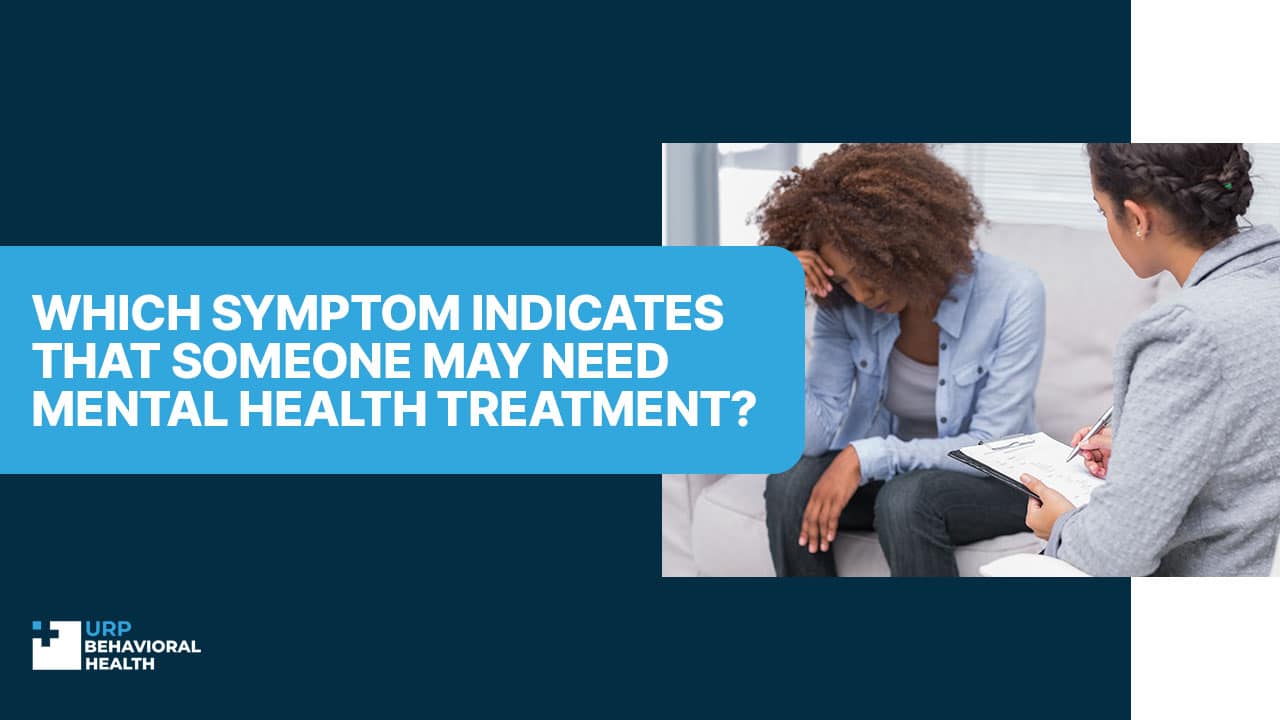
Which Symptom Indicates That Someone May Need Mental Health Treatment?
According to the Diagnostic and Statistical Manual of Mental Disorders, a mental disorder is defined as a psychological syndrome or pattern. That includes distress, disability, increased risk of death, or causes a significant loss of autonomy [2].
Mental illnesses are a common problem for people around the world and in the United States. The latest research shows that more than one in five United States struggle with different mental diseases. It’s 59.3 million or 23.1% of the U.S. adult population [3]. These diseases can include a variety of symptoms, including dangerous ones that can seriously impact a person’s life and daily routine. Such conditions demand immediate intervention.
In this article, we will explore and explain typical symptoms that indicate that you or your loved ones need mental health treatment. You can get immediate help such as from those in URP [1], including both psychiatric treatment and support.
Signs and Symptoms of Mental Illness
It can be hard sometimes to understand if something is a sign of mental illness or just normal behavior. Each disorder has its own symptoms. Sometimes these can be similar for different diseases. But if to talk about common signs of mental illnesses, these are the following:
- Changes in mood and emotions
- Social withdrawal and isolation
- Excessive worrying
- Disruption in daily functioning
- Changes in sleep and eating habits
- Physical symptoms and health issues
- Persistent sadness or hopelessness
- Difficulty concentrating or making decisions
Contact our admissions team now to begin your path toward a brighter future.
Changes in Mood and Emotions
Many people can experience sadness from time to time. It happens due to stress, experiencing some personal problems, changing weather, etc. How do you recognize that your condition requires medical help? [4].
People struggling with mental disorders can often experience changes in mood and emotional condition [5] such as:
- Mood swings
- Feeling down and sad
- Constant worrying and anxiety
- Suicidal thoughts
- A desire to isolate
- Inability to manage stress
- Outbursts of anger
- Constant tiredness
If your sadness or anger is caused by some unpleasant situation and passes fast without impacting your life and daily routine, there’s nothing to worry about. However, if you experience these conditions all the time, it’s definitely a reason to seek professional help.
Depressive Disorders
Depression is a common mental disorder that is usually characterized by constant sadness, suicidal thoughts, desire for isolation, hopelessness, sleep and eating problems, and continuous tiredness [6]. Around 5% of Earth’s population suffers from this disease [7]. Why is this happening? Depression is caused by several factors: social, psychological, and biological. This disorder can happen to anyone, especially if you experienced stress, abuse, or a strong trauma. Depression is 50% more often in women than men.
How to distinguish depression and usual sadness? This illness has a strong impact on a person’s daily routine and life overall. It usually affects your mood during the entire day for at least 2 weeks in a row.
Depression also creates a vicious circle, as this condition leads to experiencing even more stress. And stress in turn provokes the worsening of depression. This is a dangerous disorder that requires immediate treatment which you can get from professional therapists in URP [1].
Such treatment can include:
- Behavioral activation
- Cognitive behavioral therapy
- Interpersonal psychotherapy
- Problem-solving therapy
Self-care is no less important than treatment itself. This includes a healthy diet, creating a supportive environment, and lifestyle changes.
Social Withdrawal and Isolation
An early sign of mental disorders can be a desire for isolation. The latest research shows that nearly 20,000 adults in the U.S. report feeling lonely. According to an analysis, lack of social connection has a strong impact on health. This can be compared to smoking 15 cigarettes a day or uncontrolled drinking of alcohol [8].
Lots of mental disorders are characterized by a desire for isolation. These can be depression, anxiety disorders, schizophrenia, post-traumatic stress disorder, or even dimension. Isolation and social withdrawal also create a vicious circle. Isolation provokes an increased risk of mental disorders. In turn, mental disorders force people to self-isolate.
Excessive Worrying and Anxiety Disorders
To understand why anxiety is dangerous, let’s first explore how it is characterized. Occasional anxiety is normal for each person. Everyone can worry sometimes because of many reasons. But for people with anxiety, this feeling doesn’t pass. It also has a strong impact on people’s lives and daily routines. This can include problems at work, study, family, and overall communication.
In 2019, 301 million people were living with an anxiety disorder including 58 million children and adolescents [9].
There are several types of anxiety, which are:
- Generalized anxiety disorder is characterized by excessive worry
- Panic disorder is characterized by panic attacks
- Social anxiety disorder is characterized by excessive fear and worry in social situations
- Phobia-related disorders
Many risk factors can be early signs of anxiety. These are shyness in childhood, heightened stress response, and genetic predisposition. Some health and lifestyle problems can also provoke the appearance of anxiety disorders. These are physical health conditions, such as thyroid problems or heart arrhythmia, and caffeine [10].
Disruption in Daily Functioning
As we mentioned before, any mental illness can easily impact your lifestyle and daily routine. Constant sadness, tiredness, and a desire to isolate work together to make your life hell. That’s why if you notice changes in your daily functioning, it’s crucial to seek professional help. Otherwise, you can experience problems at work, school, and family. This leads to the worsening of other symptoms and an increasing risk of mental illness.
Stress Disorders and Post Traumatic Stress Disorder (PTSD)
ASD stands for Acute Stress Disorder. ASD is an internal health problem that generally appears in the first month after a traumatic event.
PTSD stands for Post Traumatic Stress Disorder. PTSD is an internal illness touched off by traumatic events. PTSD is generally accepted as a disorder of people affected by war, but war is not the only trauma that can spawn it. Post-traumatic stress disorder is generally caused by passing strong traumatic events such as natural disasters, war, violence, terrorist attacks, unanticipated death, and numerous further. PTSD is characterized by the following symptoms:
- Sleep diseases( sleep apnea, agonies, wakefulness)
- Flashbacks
- Wrathfulness
- Memory loss
- Anxiety
- Depression
- Hallucinations
- Aloneness
Around 70% of people around the world experience a potentially traumatic event during their lives. However, only 5,6 will go on to develop PTSD. Nearly 4% of the world’s population has endured PTSD at some point in their lives [11].
Around 70% of people around the world experience a potentially traumatic event during their lives. However, only 5,6% will go on to develop PTSD. And almost 4% of the world’s population has experienced PTSD at some point in their lives [12].
If you recognize the signs of PTSD it’s essential to seek professional help such as from therapists in URP [1]. There are several treatment styles for cases of post-traumatic stress disorder [13]:
- Cognitive behavioral therapy
- Cognitive processing therapy
- Cognitive therapy
- Prolonged exposure
- Brief eclectic psychotherapy
- Eye movement desensitization and reprocessing
- Narrative exposure therapy
- Medications
Changes in Sleep and Eating Habits
Another dangerous sign of possible mental illness can be changes in sleep and eating habits. This can include sleep apnea, nightmares, problems falling asleep, restless sleep, and multiple awakenings. If we talk about eating problems, it can be overeating, loss of appetite, weight loss, or gain.
There are also mental illnesses directly related to changes in sleep and eating habits. These are:
- Anorexia nervosa
- Bulimia nervosa
- Exercise bulimia
- Binge eating disorder
- Insomnia [2]
In 2019, 14 million people experienced eating disorders including almost 3 million children and adolescents [9].
Physical Symptoms and Health Issues
Physical health problems are incredibly dangerous as they create a vicious circle. Physical problems increase the risk of developing mental illnesses, and vice versa.
The latest research shows that people with mental health problems more often have bad physical conditions such as heart disease. Around one in three people with chronic physical health diseases also have a mental illness.
Why is this happening?
- Genetics
- Low motivation
- Difficulty with concentration and planning
- Lack of support
What is also important, is that mental illness can also cause some health problems such as headaches, fatigue and digestive problems, upset stomach, and insomnia [14].
What can you do to help yourself?
- Physical activity is always a great idea. Exercising releases feel-good chemicals called endorphins in the brain.
- Healthy diet. A balanced diet should include healthy amounts of proteins, essential fats, complex carbohydrates, vitamins, minerals, and water.
- Quitting bad habits such as smoking and drinking alcohol.
The most important thing to do is obviously seek professional help. If you or your loved ones are experiencing health problems connected to mental illness, don’t hesitate and make an appointment with your GP, for example, in the URP center [1].
Persistent Sadness or Hopelessness
Everyone can feel down or sad sometimes. It’s absolutely okay. However, if sadness and hopelessness last long, it can be a first and serious sign of mental illnesses such as depression [15].
What are the symptoms of an overall low mood?
- Sad
- Anxious or panicky
- Tiredness
- Being unable to sleep
- Anger
- Frustration
- Low on confidence
All these symptoms can be fixed by small steps. However, if these signs last more than two weeks, it can cause developing depression.
Here are other signs of depression:
- Not getting any enjoyment out of life
- Feeling hopeless
- Not being able to concentrate on everyday things
- Having suicidal thoughts or thoughts about harming yourself
Don’t wait - confidential help is available right now for you or your loved one.
Difficulty Concentrating or Making Decisions
Mental disorders can cause the appearance of concentration issues. This symptom is very unpleasant. It affects the entire daily routine and lifestyle. Concentrating issues can have a strong impact on people’s lives. This includes job, studying, communication with others, and functioning.
Difficulty concentrating can also be a sign of the following disorders:
- Depression
- Obsessive-compulsive disorder
- ADHD (Attention deficit hyperactivity disorder)
ADHD is usually characterized by the following symptoms [16]:
- Difficulty concentrating and paying attention
- Restlessness
- Impulsive behavior or lack of self-control
- Difficulty sustaining attention for long periods
- Forgetfulness
- Being distracted
- Being forgetful in everyday tasks
Concentrating issues can be very serious, as they affect people’s functioning. That’s why it’s crucial to seek professional help. For example, from doctors in UPR [1]. If you experience concentrating problems, don’t hesitate to make an appointment. Thanks to that you can get individualized and proper treatment as fast as possible.
Symptoms to Watch Out For
Summarizing what we have learned in previous parts, let’s let’s put all the symptoms together [4]:
- Substance abuse. It includes drug and alcohol abuse.
- Emotional outbursts. These are typically normal for people. However, emotional outbursts can also be a sign of mental problems.
- Constant anxiety that doesn’t pass.
- Disrupted sleep. This includes nightmares, sleep apnea, difficulties with falling asleep, and insomnia.
- Feeling guilty or worthless. Though we all can feel guilty sometimes, it can also be a sign of illness.
- Sudden outbursts of anger can be dangerous for you and also for people around you.
- Loss of joy. This is a common symptom of mental problems and depression
- Withdrawal and isolation. If you are experiencing problems with communication and a desire to isolate, it can be a bad symptom of a disorder.
- Restlessness and tiredness are a common symptom of mental problems.
- Eating problems. These are overeating, loss of appetite, weight loss, or gain.
- Extreme mood swings.
- Prolonged sadness. Everyone can feel down or sad sometimes. However, if sadness and hopelessness last long, it can be a sign of mental illness.
- Trouble concentrating. Concentrating issues can have a strong impact on people’s lives. This includes job, studying, communication with others, and functioning [5].
Conclusion
If you are experiencing sadness or tiredness, it doesn’t necessarily mean that you have a disorder. However, if there are more symptoms and signs, it can be dangerous for you and people around you. Mental illnesses are a common problem in the modern world. But you should always remember that this is not the end. Educating yourself and other people about psychiatric disorders is crucial [4]. It’s important to intervene in the development of disorders as fast as possible on a way to sufficient recovery.
If you feel bad, these steps can help you:
- Healthy diet
- Exercise
- Quitting bad habits
- Creating a supportive environment
However, seeking professional help is vital. In URP Behavioral Health there are many professional therapists who can make individualized and sufficient plans of treatment for each patient [1].
Don’t hesitate to ask for help. Don’t hesitate to make an appointment.
Your life is beautiful and it’s in your hands.
Reach out today and let us create a treatment plan designed around your needs.
References:
- https://urpbehavioralhealth.com
- https://www.newworldencyclopedia.org/entry/Mental_disorder
- https://www.nimh.nih.gov/health/statistics/mental-illness
- https://www.psychiatry.org/patients-families/warning-signs-of-mental-illness
- https://www.nami.org/about-mental-illness/warning-signs-and-symptoms/
- https://www.nimh.nih.gov/health/topics/depression
- https://www.who.int/news-room/fact-sheets/detail/depression
- https://www.apa.org/monitor/2019/05/ce-corner-isolation
- https://www.who.int/news-room/fact-sheets/detail/mental-disorders
- https://www.nimh.nih.gov/health/topics/anxiety-disorders
- https://www.ptsd.va.gov/understand/related/acute_stress.asp
- https://www.who.int/news-room/fact-sheets/detail/post-traumatic-stress-disorder
- https://www.apa.org/ptsd-guideline/treatments
- https://www.mentalhealth.org.uk/explore-mental-health/a-z-topics/physical-health-and-mental-health#:~:text=Our%20bodies%20and%20minds%20are,insomnia%2C%20restlessness%20and%20difficulty%20concentrating.
- https://www.nhs.uk/mental-health/feelings-symptoms-behaviours/feelings-and-symptoms/low-mood-sadness-depression/
- https://www.medicalnewstoday.com/articles/unable-to-concentrate#sign-of-adhd
















